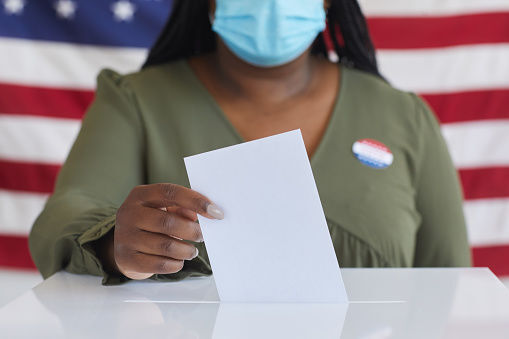Arizonans remain legally barred from taking someone else’s ballot to the polls, at least for this election.
Without comment, the U.S. Supreme Court on Friday agreed to review a federal appeals court’s decision earlier this year on the issue.
The appeals court had voided the state’s ban on “ballot harvesting” after finding the Republican-controlled Legislature enacted the 2016 law with the intent of suppressing minority votes.
The state law makes it a felony, subject to one year in state prison and a $150,000 fine, to handle anyone else’s already voted ballot.
There are exceptions for family members, others in the same household, caregivers, election workers and the postal service.
Friday’s decision does not necessarily mean the law will be overturned.
But it does mean that at least four justices found sufficient merit to arguments by Republican Attorney General Mark Brnovich and the Arizona Republican Party that lawmakers, in enacting the law, had valid concerns about the possibility of fraud.
Friday’s decision also means the justices will review another part of the same 2016 law, which says if someone votes in the wrong precinct, all votes that person cast are discarded.
The appellate court said the state should count the votes that would have been legal had the person been at the right place, such as for a statewide office like governor.
The justices now need to set a date for a hearing. A ruling may not come until June.
The issue arose because most Arizonans receive early ballots.
They can be filled out and mailed back or delivered to polling places.
But state law requires mailed ballots to be delivered no later than 7 p.m. on Election Day. That means anything dropped in a mailbox within a week or so may not get counted.
Political and civic groups have in recent years gone into neighborhoods, asking people if they have returned their ballots and, if not, offering to take the papers to polling places on their behalf.
But Republicans, in approving the law to ban the practice, argued that presents too many opportunities for mischief.
During the debate, however, supporters of the ban did not cite a single confirmed incident where a ballot was altered or did not get delivered.
The state and national Democratic parties sued, and a trial judge upheld the law.
But in a divided decision, a majority of the 9th Circuit Court of Appeals found the law was based on a desire by the GOP majority in the Legislature to suppress minority votes. Justice William Fletcher, writing for the majority, said the record shows it had that effect.
He said the trial record that before the law was enacted in 2016, minorities were more likely than non-minorities to get someone else to turn in their ballots.
“Individuals who engaged in ballot collections in past elections observed that voters in predominantly white areas were not as interested in ballot-collect services,” the judge wrote.
Brnovich, in his arguments to the high court, said it’s irrelevant that there were no documented cases of fraud related to ballot harvesting.
“Prohibiting unlimited third-party harvesting is a commonsense means of protecting the secret ballot and preventing undue influence, voter fraud, ballot tampering, and voter intimidation,” he wrote.
Brnovich rejected the contention that the law is simply an attempt by the Republicans who control the House and Senate, then and now, to get and keep a political edge.
He pointed to the 2005 recommendation of the Commission on Federal Elections Reform, co-chaired by former President Jimmy Carter, a Democrat, that states should prohibit outsiders from handling absentee ballots of others.
“There’s 20 states that have similar measures,” Brnovich said. He also noted that Arizona has exceptions for family and household members and caregivers.
Brnovich also wants the justices to ignore one thing cited by Fletcher in the ruling: comments by then-Sen. Don Shooter, R-Yuma, who attempted to get colleagues to enact a similar law. That was after he won his 2010 election with just 53% of the vote — receiving 83% of the non-minority vote but only 20% of the Hispanic vote.
Fletcher said Shooter was “in part motivated by a desire to eliminate what had become an effective Democratic GOTV (Get Out The Vote) strategy.” In finally enacting the law in 2016, he said, “Republican legislators were motivated by the unfounded and often far-fetched allegations of ballot collection made by former Sen. Shooter.”
Brnovich countered, “Each legislator is an independent actor.” He said there is no proof Arizona lawmakers acted with racial motives.
Friday’s decision is a setback for Secretary of State Katie Hobbs, a Democrat.
In her own legal filings with the Supreme Court, Hobbs pointed out that it was the Secretary of State’s Office that had been sued over the issue, before she held the office. Hobbs said that means she, as the current holder of the office, had sole authority to decide whether to appeal the 9th Circuit ruling.
Hobbs said she believes the appellate judges got it right. And she argued, unsuccessfully, that Brnovich cannot maintain a legal action to defend the law.





